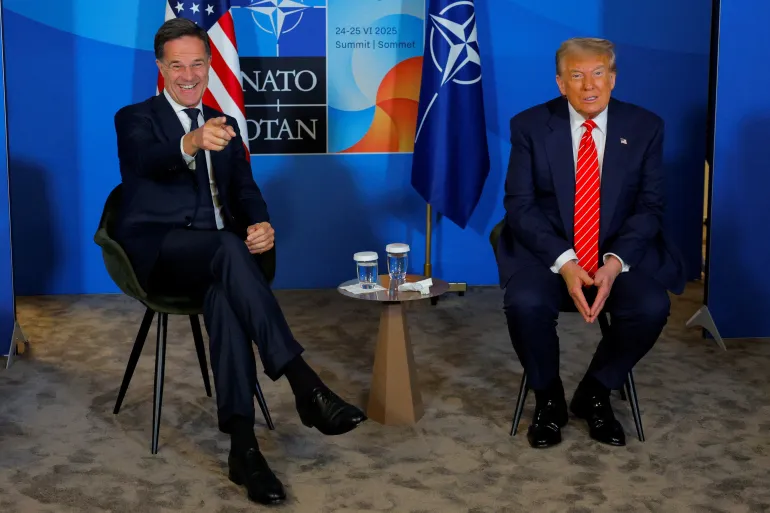
Wafric News – June 25, 2025
The Hague - United States President Donald Trump has reaffirmed his country's commitment to NATO's collective defence pact—Article 5—after previous remarks that cast doubt on Washington’s long-standing obligations to its transatlantic partners.
Speaking alongside NATO Secretary-General Mark Rutte in The Hague on Wednesday, Trump declared, “We’re with them all the way,” just as the alliance’s 32 leaders convened to discuss what could be a historic leap in defence spending.
At the heart of the summit: Trump’s push for NATO members to dramatically raise military expenditure from the current 2% of GDP target to an ambitious 5%—a demand that has sparked friction across Europe and raised new questions about burden-sharing and power politics within the alliance.
A Shift in Tone—But Not Without Conditions
Although Trump’s reassurance about Article 5 sounded definitive, his earlier comments hinted at ambiguity. “Depends on your definition,” he had said when asked about the US’s commitment to NATO’s central mutual defence clause. “There’s numerous definitions of Article 5... but I’m committed to being their friend.”
Those remarks unsettled some allies, particularly amid heightened tensions with Russia and lingering doubts over NATO’s ability to present a united front.
Rutte, who now leads the alliance, sought to contain the unease. “There is absolute clarity that the United States is totally committed to NATO,” he said, while acknowledging that the summit would place heavy emphasis on getting European members to boost military investments.
Europe Reacts: Mixed Signals on 5% Defence Target
The proposed 5% GDP military spending target, meant to be achieved by 2035, has triggered deep divisions within the bloc.
While NATO’s wealthier nations like Germany and the UK have pledged major military upgrades—Germany promising to become Europe’s “strongest conventional army,” and the UK committing to nuclear-capable jet purchases—others have pushed back firmly.
Spain, NATO’s lowest spender according to alliance estimates, rejected the proposed target outright. “Unreasonable,” said Spanish officials, prompting Trump to publicly call out Madrid: “There’s a problem with Spain… it’s very unfair to the rest of them.”
Belgium and Slovakia have also expressed resistance, with the latter insisting on its right to independently set defence expenditure levels.
As of now, nine member states still fall below the current 2% threshold.
An Alliance Under Pressure—But Not Cracking
Despite internal disputes, other NATO leaders sought to project unity. Polish President Andrzej Duda stood firm on the alliance’s founding principle: “Article 5 is clear... there is no discussion.”
Denmark’s Prime Minister Mette Frederiksen said Europe had disarmed for too long and now needed to meet its security obligations. Finnish President Alexander Stubb, representing a country with a long border with Russia, saw the summit as transformative.
“I think we’re witnessing the birth of a new NATO,” said Stubb. “A more balanced NATO, and a NATO which has more European responsibility.”
Africa Watches From Afar—But the Ripples Are Felt
While the NATO summit unfolds in Europe, its decisions ripple far beyond the continent. With increased militarisation and renewed east-west polarisation, African leaders are watching closely—particularly those in regions where foreign bases, drone operations, and shifting global alliances intersect with domestic sovereignty.
Trump’s transactional diplomacy—demanding higher spending while hedging on defence commitments—highlights a broader geopolitical trend: major powers continuing to shape global security frameworks with minimal input from the Global South.
For many observers across Africa, the NATO debate raises familiar concerns: Who defines security? Who bears the costs? And whose voices are missing from the table?
By WafricNews Desk.
By WafricNews Desk.


Comment
To post a comment, you have to login first
LoginNo Comments Yet...